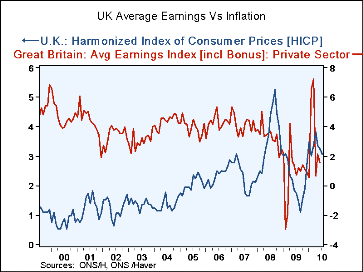 Global| Aug 18 2010
Global| Aug 18 2010UK Earnings Move Higher, But Not By Enough To Matter
Summary
Earnings trends: UK average earnings (including bonuses) rose economy-wide in June. But the private sector saw earnings drop by 1.1%. Over three-months earnings are falling on both measures, over six months a small rise is in place; [...]
 Earnings trends: UK average earnings (including bonuses) rose economy-wide in June. But the private sector saw
earnings drop by 1.1%.
Over three-months earnings are falling on both measures, over six months a small rise is in place; over 12-months an even weaker
pace of advance is in play.
Earnings trends: UK average earnings (including bonuses) rose economy-wide in June. But the private sector saw
earnings drop by 1.1%.
Over three-months earnings are falling on both measures, over six months a small rise is in place; over 12-months an even weaker
pace of advance is in play.
What those trends mean: As the Yr/Yr pace of overall earnings has dropped, become volatile and edged higher, inflation has risen, become volatile and begun to edge a bit lower. Still, since 2008 with a few minor exceptions that can be chalked up to volatility, real earnings have been dropping. From 2008 onward, real earnings are eroding; currently they are off by 1.3% Yr/Yr. Thus earnings, the largest source of consumer incomes, are not keeping pace with inflation. And that does not bode well for consumer spending trends.
Disparate dynamics in the UK - With such disparate dynamics in place it is no wonder that the BOE Policy Committee is having disagreements on what to do. In its recent deliberations we are informed that there remains a disagreement among committee members over what to do next, even though the committee stood behind the previous month's decision to stand pat. Monetary Policy Committee member Andrew Sentance continues to call for a 25 basis point rate hike (for the third month running), minutes of the BOE's August 4-5 meeting now show. But the majority of the Committee continues to think it is be best to keep interest rates on hold and maintain the central bank's 200 billion pound asset purchase scheme because of significant risks on both sides of the inflation outlook; note they said 'both sides'.
Curiouser and curiouser...policy splits amid unusual circumstances - The BOE has a policy split just as does the Federal Reserve in the US. Central banks are torn between their main mandate (or 'sole' mandate) to pursue price stability and a usually secondary mandate but currently one that has risen in ranking (at least implicitly); that is the mandate to maintain market liquidity and financial stability. Nothing but so dire a risk would dissuade most central bankers from what most see as their main mission of inflation fighting/price stability (even though the Fed's mandate may be perceived as a bit mixed on this score). Still, it gets even more complicated than that. The price stability mandate is usually thought of as a mandate to keep inflation down; it is an unusual circumstance for a price stability mandate to be employed to keep markets liquid. And perhaps a bit more unusual to employ such an argument with inflation having been in a persistent overshoot of the central bank's inflation ceiling, as it has been in the UK. But such are the times. In the UK growth prospects are still a bit uncertain despite a good deal of government/central bank intervention, complicated by newly adopted fiscal austerity measures, and by a still somewhat lofty (over the ceiling) pace of inflation.
| UK (Great Britain) Earnings | ||||||
|---|---|---|---|---|---|---|
| All Seas. Adj. | Jun-10 | May-10 | Apr-10 | 3mo | 6-mo | 12-mo |
| Avg Earnings:All | Level in Month | Avg in Period | ||||
| All | 140.9 | 140.7 | 140.8 | 141.5 | 140.4 | 139.5 |
| Private | 139.4 | 139.8 | 139.7 | 140.5 | 138.9 | 138.2 |
| Change in % | %Change in MO | % Change over period: AR | ||||
| ALL | 0.6% | -0.3% | -7.6% | -7.3% | 2.2% | 1.9% |
| Private | -1.1% | 0.3% | -8.4% | -9.2% | 2.9% | 1.5% |
| Real Earnings% | %Change in MO | % Change over period: AR | ||||
| ALL | 0.2% | 0.4% | -9.5% | -8.9% | -1.2% | -1.3% |
Robert Brusca
AuthorMore in Author Profile »Robert A. Brusca is Chief Economist of Fact and Opinion Economics, a consulting firm he founded in Manhattan. He has been an economist on Wall Street for over 25 years. He has visited central banking and large institutional clients in over 30 countries in his career as an economist. Mr. Brusca was a Divisional Research Chief at the Federal Reserve Bank of NY (Chief of the International Financial markets Division), a Fed Watcher at Irving Trust and Chief Economist at Nikko Securities International. He is widely quoted and appears in various media. Mr. Brusca holds an MA and Ph.D. in economics from Michigan State University and a BA in Economics from the University of Michigan. His research pursues his strong interests in non aligned policy economics as well as international economics. FAO Economics’ research targets investors to assist them in making better investment decisions in stocks, bonds and in a variety of international assets. The company does not manage money and has no conflicts in giving economic advice.






